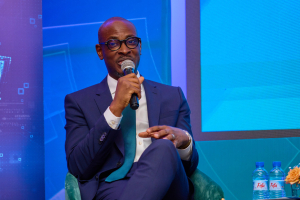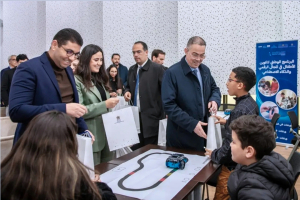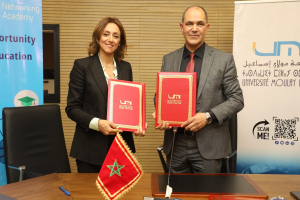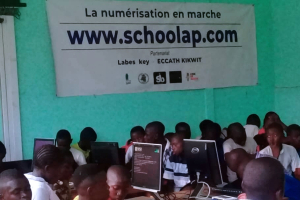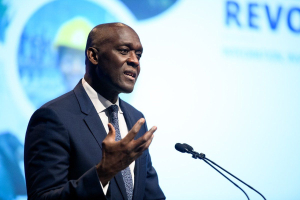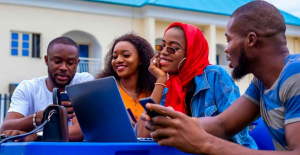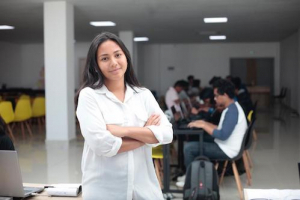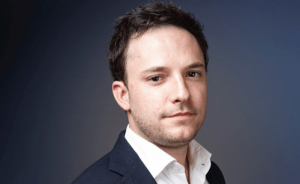Benin Signs Three Deals to Boost Digital Transformation
Benin is ramping up its digital transformation through strategic partnerships to strengthen cybersecurity, drive innovation, and train future talent.
On the sidelines of the fifth Cyber Africa Forum (CAF) in Cotonou last week, the Agency for Information Systems and Digital (ASIN) — the government’s operational arm in the digital sector — signed three key agreements.
“CAF 2025 was the perfect setting to sign these three partnerships,” said Marc-André Loko, Director General of ASIN. “Benin, like other African countries, is truly engaging in a dynamic to become a producer of technology. We no longer want to be mere consumers of technology.”
ASIN signed the first two agreements with Senegal’s Orbus Digital Services (ODS) and Benin’s Quality Corporate. These deals aim to build digital trust by strengthening cybersecurity, improving data governance, and ensuring regulatory compliance. This effort is crucial as West Africa faces a surge in cyberattacks targeting governments, companies, and citizens.
ASIN signed the third agreement with the Institute for Inclusive Digital Africa (IIDiA), backed by the Bill & Melinda Gates Foundation. This partnership will set up a digital innovation lab to spur innovation, train local talent, and modernize public services. The goal is to advance digital inclusion and develop new skills.
These agreements support Benin’s digital strategy, which aims to make technology a driver of inclusive growth. According to GSMA, digitalizing Benin’s economy could add up to CFA1,200 billion (around $2.2 billion) to the GDP by 2028, create over 300,000 jobs, and boost tax revenues.
With these new partnerships, Benin is laying the foundation for a stronger, more innovative, and more inclusive digital ecosystem. The deals reinforce Benin’s ambition to lead in technological innovation in West Africa, focusing on digital trust, inclusion, and local talent to build lasting digital sovereignty.
This article was initially published in French by Samira Njoya
Edited in English by Ange Jason Quenum
Morocco Expands Digital Education with Youth Initiative
Moroccan authorities are prioritizing the development of citizens' digital skills. As part of this effort, they signed an agreement in late February to establish a specialized coding school in the Fès-Meknès region.
The Moroccan government will train children in digital skills and artificial intelligence as part of a national strategy to enhance its digital workforce.
An agreement was signed for that purpose on Saturday, March 8, between several stakeholders, under the supervision of Amal El Fallah-Seghrouchni, the Minister Delegate in charge of Digital Transition and Administrative Reform.
The partnership also includes the Ministry of Youth, Culture and Communication, the Ministry of Economy and Finance, and Mohammed VI Polytechnic University.
"This national program aims to introduce children to digital technologies and artificial intelligence through training workshops while instilling in them a responsible and secure use of digital tools," the ministry said in a press release published on social media. "Adopting an inclusive approach, this initiative seeks to support young digital talents across the Kingdom to integrate them into the country's digital transformation dynamic."
The initiative aligns with Morocco's ambition to "develop a pool of high-quality digital talent," as outlined in the Digital Morocco 2030 strategy. The Kingdom also aims to move up the value chain and strengthen its position in the outsourcing and digital export sectors.
In late February, an agreement was signed to establish a specialized school for programming and coding in the Fès-Meknès region.
The program could prepare Moroccan children for a rapidly evolving job market driven by accelerated digital transformation. According to the World Bank estimates, by 2030, nearly 230 million jobs in Sub-Saharan Africa will require digital skills. While Morocco is not part of Sub-Saharan Africa, the projection underscores the strategic importance of digital skills training in supporting the digital transition of African countries.
By Isaac K. Kassouwi,
Editing by Sèna D. B. de Sodji
Morocco's Moulay Ismail University, Cisco Partner to Boost Tech Skills
Morocco is firmly committed to digital transformation. Recognizing that human resources are the cornerstone of this endeavor, the country is implementing initiatives to modernize educational programs by integrating digital skills from an early age.
The University of Moulay Ismail signed a partnership agreement with Cisco Network Academy, a global online learning platform offered by American technology giant Cisco Systems, on Wednesday, May 8.
This collaboration, established during a visit by a Cisco Network Academy delegation to Morocco, is designed to equip students and faculty with in-demand digital skills in critical areas like computer networking, artificial intelligence, programmable infrastructure, and cybersecurity.
The initiative aligns perfectly with Morocco's "Pacte Esri 2030," the National Plan for Accelerating the Transformation of the Higher Education, Scientific Research, and Innovation Ecosystem by 2030. This strategic plan emphasizes preparing students with the necessary personal, cross-disciplinary, and digital skills to meet the evolving demands of the job market, reflecting both royal directives and the global digital revolution.
The partnership builds upon a tripartite agreement signed last December between the Moroccan Ministry of Higher Education, the Ministry of Digital Transition and Administrative Reform, and Cisco.
Furthermore, this new collaboration aims to strengthen the training and certification programs offered through the "Centres code 212" hosted by Moroccan universities. Students and teachers will gain free, unlimited access to Cisco's partner training programs, along with support in preparing for industry-recognized certifications.
By prioritizing youth training and upskilling the population in digital capabilities, Morocco seeks to cultivate a robust pool of graduates equipped with specialized knowledge in innovative fields. This initiative aims to accelerate the nation's digital transformation journey and position Morocco as an attractive destination for both domestic and international investors.
Samira Njoya
DR Congo: Schoolap Provides Online Learning Solutions through Web and Mobile Apps
Available in several countries on the continent, including the Democratic Republic of Congo (DRC), Côte d'Ivoire, Seychelles, Kenya, Nigeria, and Benin, the startup wants to conquer the continent with its solutions and educational kit.
Congolese startup Labes Key has developed Schoolap, a digital solution that allows school administrators to centralize their management, students, and teachers to access textbooks and educational materials online, and parents to stay informed about their children’s progress.
Founded in 2017 by Pascal Kanik and Guy-José Leta, the Dubai-based startup raised $500,000 in 2019 to accelerate its growth.
The solution, accessible via an Android-only mobile app, requires users to fill out an account creation form to access the platform’s content. Depending on the learner’s level of study, they can access online courses available in video and text formats, designed for primary and secondary school students and teachers.
Schoolap also offers sign language content for deaf-mute learners and cartoons for younger learners. Notably, the content can be accessed offline. The startup provides a comprehensive kit to enable users to access educational content anywhere, anytime.
According to Schoolap’s data, over 23,361 pieces of educational content are available on their web and mobile platforms, which have recorded over 7,612,109 visits since their launch. The mobile application has been downloaded over a thousand times on the Play Store. In April 2019, Schoolap won the prize for the best online education platform at Seedstars, a competition focused on emerging market startups.
Adoni Conrad Quenum
IFC launches a $225mn vehicle to support SMEs, mainly in Africa
Developing innovative solutions to boost the SME world is a major concern for African economies. Yet, accessing financing remains a headache for sector players.
On Tuesday, November 15, the International Finance Corporation (IFC) announced the launch of a new vehicle dedicated to supporting venture capital systems in Africa, the Middle East, Central Asia, and Pakistan. This $225 million fund will provide seed funding for startups that address development issues in areas such as climate, health, education, agriculture, e-commerce, etc. through technological innovations.
“Support for entrepreneurship and digital transformation is essential to economic growth, job creation, and resilience. It will help innovative tech companies in Africa, the Middle East, Central Asia, and Pakistan expand during a time of capital shortage and create scalable investment opportunities. We want to help develop homegrown innovative solutions that are not only relevant to emerging countries but to the rest of the world,” said Makhtar Diop, IFC's Managing Director.
The already difficult access to funding for startups in low-income countries has worsened with the global slowdown in venture capital investment, the Covid-19 pandemic, rising food and supply chain costs, rising interest rates, and currency devaluations. However, countries still have a huge potential for development. In Africa, for example, the digital economy could contribute up to $712 billion to the continent’s GDP by 2050, according to a report published on June 9 by the international network of high-impact entrepreneurs Endeavor.
The IFC sees in its new platform a way to boost nascent venture capital markets in regions that have shown early growth potential but face challenging global economic conditions. The international organization says it will make equity and quasi-equity investments in tech startups and help them grow into scalable companies capable of attracting traditional equity and debt financing. It will also use the platform to collaborate with other World Bank Group teams to build and support venture capital ecosystems through regulatory reforms, sector analysis, and other tools.
An additional $50 million will be provided by the International Development Association's Private Sector Window Blended Finance Facility, which helps reduce the risk of investments in low-income countries.
Samira Njoya
AfDB selects 500 Coding for Employment digital ambassadors
There is a growing number of coding and digital training programs in Africa. The said programs aim to equip the youth with ICT skills that render them competitive in the digital economy.
Last Friday, July 15, on the sidelines of the World Youth Skills Day, the African Development Bank (AfDB) announced the selection of 500 Coding for Employment digital ambassadors “who will lead a peer-to-peer training model.”
The selected digital ambassadors will undergo three months of training in digital skills such as software development, problem-solving, project management, and communication. At the end of the training, they will receive ICT toolkits to “offer the same training” in their local communities to allow access to digital skills for more Africans, in rural communities with limited internet connectivity notably.
For this first edition of the digital ambassador program, AfDB (through its Coding for Employment) and its technical partner Microsoft, received 21,000 applications from all over Africa. In the end, 500 young people from four countries where the AfDB's Coding for Employment program is operational were selected. Those countries are notably Côte d'Ivoire (75 selected), Kenya (100), Nigeria (150), and Senegal (175).
“We are delighted by the enthusiasm and the passion the candidates have shown for the program. We have sifted through all the applications to identify candidates whose backgrounds and qualifications closely match the selection criteria. The 500 candidates will not only acquire skills that can help them find work but will also be able to create their jobs while also training others," said Hendrina Doroba, the AfDB’s Head of Education and Skills Development.
Coding for Employment, launched in 2018, is one of AfDB’s programs to achieve the goals of its Jobs for Youth in Africa (JfYA) Strategy. It aims to enable the youth “to bring about economic and social transformation in the digital age.”
With the JfYA strategy, the AfDB wants to create 25 million jobs in key sectors and increase the employability and entrepreneurial success of some 50 million young people by training them in hard and soft skills.
Samira Njoya
Nigeria to train 1 mln developers in the next 18 months
Nigeria is currently working on a program to train 1 million developers in the coming 18 months, Communications Minister Isa Ali Pantami (photo) announces.
The government official made the revelation during a virtual event on the “Role of Software Testing in Nigeria’s Digital Economy.” He stressed the need to license more software developers given the increasingly major role being played by software in all aspects of human life. He also pointed at the need for a secure system to make sure the market is not ridden with vulnerable software.
“We want to see how we can license some of you to provide these services, that means if I develop software, I need to come to a certified tester to make sure I meet the standard quality assurance; all the basic bug-free, and the vulnerability assessment before I am able to sell that software,” he said.
The training program will be implemented by the National Information Technology Development Agency (NITDA) and target both professionals and inexperienced actors. During the virtual event, Isa Ali also called digital actors to support the program.
Vanessa Ngono Atangana
Africa: Malagasy EdTech Sayna raises US$600k to enter new markets
The online training platform has already convinced several investors with its innovative model. Its ambition is to enter new African markets and prepare millions of residents for the digital economy.
Malagasy start-up Sayna raised, Thursday (April 28), US$600,000 from Orange Ventures, Launch Africa Ventures, and MAIC Investors Club, to develop its operations.
The startup created Sayna Academy, a computer skills training platform, and Sayna Works, a micro-task platform. With the funds raised, it wants to upgrade its platforms to be able to host 257,000 microtasks and attract more than 3,000 active freelancers and 12,000 learners by 2024.
In 2021, its founder, Matina Razafimahefa, unveiled the startup's plan to enter the Ivorian, Ghanaian and Senegalese markets.
“This fundraising is both a crucial step for SAYNA’s international development and a strong symbol for the Madagascar tech scene. Our team is today composed of 25 people split between France and Madagascar. This is also a sign of hope for hundreds of thousands of young African talents who, until now, have not had the opportunity to become professionals to take advantage of the fourth industrial revolution underway on the continent,” she said commenting the fundraising.
Sayna was founded in 2018 and quickly attracted ambitious young people looking to acquire soft skills to improve their living conditions.
For Zach George, managing partner of Launch Africa Ventures, “Sayna, with its focus on soft skills training, mentorships, and a peer-to-peer learning environment, stands a good chance of becoming a direct gateway to projects, experience, and income for youth across the African continent.”
In 2021, the startup obtained over US$105,000 from I&P Acceleration Technologies, a program that funds startups in sub-Saharan Africa thanks to support from the French Development Agency (AFD), through the Digital Africa Initiative. To date, it claims 450 learners trained and over 609 corporate partners and clients served.
Muriel Edjo
OIF launches digital skills training for young Africans
The Organisation Internationale de la Francophonie announced the opening of several digital training courses for young Africans. The program, which first targets Tunisia and Togo, is part of the pilot phase of the institution’s "D-CLIC, train yourself in the digital" initiative.
The training targets people aged between 18 and 35. In Tunisia, the first course focuses on the development of multiplatform video games while the second addresses the production of augmented reality / virtual reality applications. The courses are organized in partnership with NetInfo and will be held in the cities of Nabeul and Tunis, starting from February 11, 2022, for 12 weeks each. Registrations are open until February 10.
In Togo, the training will be held in Lome on web and mobile application development. The courses, led by the pan-African organization Energy Generation, will be held over 6 months.
Ten countries overall are targeted by the "D-CLIC, train yourself in the digital" program. These are Côte d'Ivoire, Djibouti, Gabon, Haiti, Madagascar, Mali, Niger, DR Congo, Togo, and Tunisia. While several of these countries have already hosted training, and will soon host additional modules, Djibouti and Gabon are expected to soon host their first courses.
"D-CLIC, train yourself in the digital" is aimed at strengthening the technical and professional digital skills of young people and women in the Francophone area to increase their chances of accessing decent jobs in business and entrepreneurship.
Vanessa Ngono Atangana
Kajou raises €1mln to develop digital training content in Africa
The low mobile internet penetration rate in Africa (only 28% in 2020 according to GSMA) is a huge obstacle to online learning. To tackle this issue and make learning content more accessible, the startup Kajou came up with an offline solution. The company is now in full expansion.
Kajou closed a €1 million round of financing last January 10, with the impact investment funds Phitrust, Colam Impact, and Hippolyte Capital. Business Angels, mostly from the Ashoka network, also took part in the round. The beneficiary plans to use the money to intensify its activity in Senegal and accelerate the development of its digital training content offer in West and Central Africa, particularly in Senegal, Côte d'Ivoire, Benin, Togo, and Cameroon.
The digital training content offered by Kajou is available on micro SD cards that can be inserted into a smartphone. The information is then accessed via the Kajou application. Users can browse up to 32 gigabytes (GB) of selected content in local languages. Multiple sectors, including health, the environment, agriculture, and entrepreneurship are covered. The app also allows users to share content with their friends, without using data.
Jérémy Lachal (pictured), the founder of Kajou, sees the digital solution as "a great tool to bring knowledge directly to your phone. It allows you to consult thousands of contents without using your Internet data. We are knowledge activists. Because where there is knowledge, there is hope.”
Kajou has been in operation for 18 months and already has more than 20,000 users. The startup is a response to the need for access to knowledge in Africa, where the mobile Internet penetration rate is still only 28%, according to "The Mobile Economy: Sub-Saharan Africa 2021" report by the Global System Operators' Association (GSMA).
Kajou wants to reach more than 3 million people in West Africa with its digital library. It sees this investment as a way to allow its users to get information, educate themselves, and develop their professional activity.
Muriel Edjo


